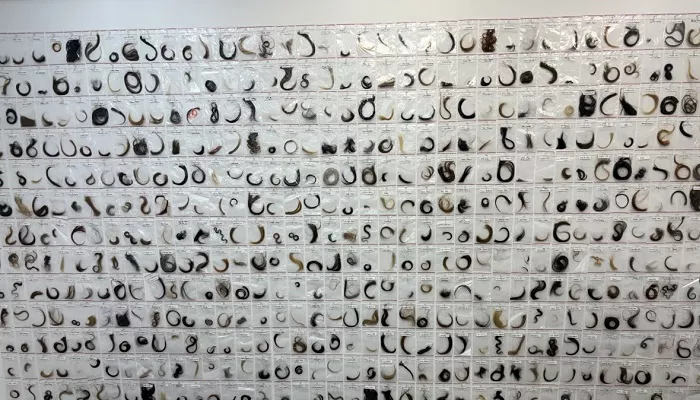NEW YORK, NY — Tucked into a quiet corner of New York City, Angelina Jolie’s women-focused atelier is making waves far beyond the fashion world. This spring, it became home to a powerful art exhibition that turns strands of hair into symbols of global protest.
The exhibit, part of the Strand for Women project by French artist Prune Nourry, is a moving tribute to the resistance of women around the world—particularly Iranian women—who cut their hair in protest following the 2022 death of Mahsa Amini. The project, which began in 2023, returns in 2025 with even greater urgency and impact.
Among the most personal contributions are strands of hair cut by Angelina Jolie herself—from her daughters, Shiloh and Zahara. Their locks now hang alongside hair from other activists and artists, woven into a collective tapestry of resistance.
“This isn’t just art. It’s a cry for justice,” a visitor shared. “Each strand is a voice, silenced perhaps, but never surrendered.”
The exhibition has grown into a global collaboration. Artists such as Shirin Neshat, Newsha Tavakolian, and Kubra Khademi have joined the movement, combining visual storytelling with political defiance. Collaborators including Andrew Ondrejcak and Zarif Design add layers of depth to this ongoing visual archive of protest.
From Hair to Hope: Supporting Afghan Women
This year, Jolie’s atelier also embraced a new mission: supporting Afghan women through a partnership with the Malala Fund. In collaboration with Sahar Halaimzai, Senior Director of the Afghanistan Initiative, the atelier now features a corner dedicated to traditional Afghan crafts.
These handmade pieces, created by women artisans, represent both resilience and hope. The sales help fund education and empowerment programs for girls and women in Afghanistan, a mission at the core of the Malala Fund.
Coffee, Culture, and Conversation
The atmosphere inside the atelier is one of quiet strength. Visitors are welcomed with Turkish coffee—now $7.50, but served as a gesture of cultural pride, not a mark of inflation. “It’s more than a drink. It’s a statement,” a staff member explained.
Downstairs, silence reigns. Visitors make eye contact, share nods of solidarity, and take in the stories told without words. “The real struggle,” said one Afghan woman, “is making the invisible visible.”
A Café That Feeds the Soul
Beyond the gallery walls, the atelier’s café offers a unique culinary experience through a partnership with Eat Offbeat—a catering company run by refugee chefs. The menu showcases dishes from Yemen, Syria, Sri Lanka, Venezuela, and more.
Each plate carries the story of its maker, highlighting the resilience and rich heritage of people who have been displaced. The café is not just a dining space, but a platform for cultural exchange, employment, and dignity.
Art as Resistance, Hair as Voice
In Jolie’s atelier, every element—from a lock of hair to a cup of coffee—serves a greater purpose. It is a space of solidarity, remembrance, and transformation.
Sometimes, words are not enough. In this sanctuary for women’s stories, a single strand of hair speaks louder than any headline.
Related topics:
- Yankees Revise Longstanding Facial Hair Policy, Now Allowing Beards
- How Alesha Dixon’s Hairstylist Fights Frizz on Rainy Days
- Wes Welker Undergoes Hair Restoration Procedure Ahead of NFL Season


